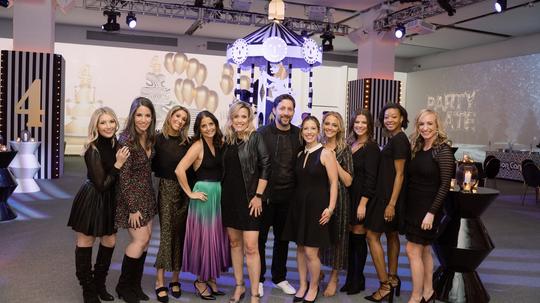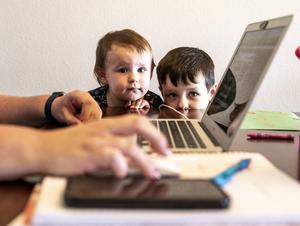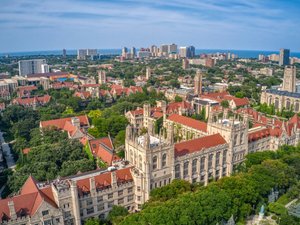
Now that her entire staff is working remotely due to the novel coronavirus crisis, Julie Roth Novack, the co-founder and CEO of events-planning startup PartySlate, has a much different workday.
Each morning, as opposed to heading into PartySlate’s River North offices, Novack heads into her home’s guest bedroom and logs onto Zoom. And on a 9:30 a.m. video chat with her leadership team, Novack gives and receives updates on how the virus is impacting PartySlate.
“As soon as social distancing and work-from-home [policies] came out, we knew this would be a very, very serious impact,” Novack said. “On the corporate event side, there were a lot of flat out cancellations and that is really tough for the industry.”
PartySlate, which Novack launched in 2016, is a photo-rich online platform that connects users to event professionals and venues in 14 cities across the U.S. PartySlate is the only event platform that offers planning expertise for a range of events, not just weddings, Novack said.
Like the travel and restaurant industries, the events sector has taken a particularly hard hit, as the virus has shut down nearly everything. People can barely leave their homes, let alone attend an event since shelter-in-place mandates began in March.
To survive the drastic drop in event hosting and to extend its runway, PartySlate has imposed salary reductions and a “restructuring” of its sales and customer success teams that resulted in four employees being laid off, Novack said.

Now, PartySlate, which employs 35 people, is on a hiring freeze. The goal of these steps is to cut $1 million of expenses over the next 18 months, Novack said, adding that PartySlate has applied for federal grants and loans provided under the $2 trillion stimulus package.
Since the coronavirus crisis began, Novack said about 20 percent of PartySlate’s 600 paying premium members paused their memberships. The company’s premium service gives subscribers an enhanced profile page, more exposure and “white glove” service in which PartySlate posts content on clients’ behalf.
To keep engagement with PartySlate somewhat on track, the company has begun offering more frequent and free digital events for its clients. These events, which generally took place about once a quarter, are now taking place weekly, and provide watchers with insights on how to keep their events businesses productive during this period of social distancing. Novack said more than 500 people from around the world have registered for individual events.
Though not a direct revenue generator, Novack said the digital events provide more exposure for PartySlate, which helps attract new clients when the crisis is over.
“We’re getting incredible feedback from our industry that we are adding value and that we are helping them work on business and brand-building projects while they are in isolation,” Novack said. “We will have stronger relationships with this industry as we come out of this crisis, and I think the focus on adding value directly and indirectly related to PartySlate has been a good strategy for us.”
Another strategy PartySlate is considering includes digitally launching in new cities amid coronavirus. Novack said Las Vegas, Orlando and Denver top the list of markets she’s thinking about.
"as a venture-backed business, growth expectations are high."
“We would get a Zoom event set up with 30 to 50 of the top leaders in Las Vegas and have an educational event, a networking event, and actually work to build the free profiles of the people on that call and get the market warmed up,” Novack said.
Besides PartySlate’s premium membership model, the startup doesn’t have any other revenue streams, but it does have investors. Earlier this year, PartySlate raised $5.5 million in a Series A round, which brought its total funding to $11.2 million, Novack said.
“We are very fortunate that we closed our Series A in January,” said Novack, who is one of a handful of female founders in Chicago to raise more than $10 million. “But as a venture-backed business, growth expectations are high.”
Before launching PartySlate in 2016, Novack was the executive vice president of mobile solutions at Chicago marketing company Vibes Media. Prior to that, she was an executive at Agency.com, and assistant vice president and co-founder of Chase Bank’s digital team.
“Because I’m an experienced founder and I’ve been through the 2008 crisis and Sept. 11 as a leader—that prepared me for this,” Novack said. “We met as a leadership team and started walking through scenarios of how it could impact our clients, our business, and it wasn’t until February, when it really became top of mind that this going to be a crisis.”
By March 10, all of PartySlate’s employees were working remote and will continue to do so for the foreseeable future.

“Zoom is working better than I thought it would,” said Novack, adding that the video-chatting is fostering more connected relationships between her and her staff. Besides Zoom, PartySlate is also using digital workplace tools like Monday and Slack to stay organized.
“One of the things I didn’t expect is that sometimes we’re having these Zoom calls and there’s babies and kids and dogs in the picture,” Novack said. “We’re getting to know each other in a more personal way because we’re in our homes.”
Being at home all the time is a new experience for Novack, who usually has a packed calendar of events and travel. But the extra time at home has meant spending more quality time with her husband, three children and pet dog.
“On a personal level, family dinners where we’re cooking every night have been really nice,” she says.
But even though she isn't spending her days and evenings out and about on behalf of PartySlate, Novack says planning for the company's post-coronavirus future keeps her more than busy.
One of the biggest challenges in front of PartySlate is the uncertainty around when the coronavirus crisis will come to an end. Novack said she hopes the events industry is back to normal by September. But the longer cities are ordered to shelter-in-place, prohibiting event hosting, the more stress will be put on PartySlate’s finances.
“We don’t know how long this is going to last,” Novack said. “Even if social distancing ends in June, there’s still going to be the virus. And how quickly are people going to go back to having these large-scale events?"








